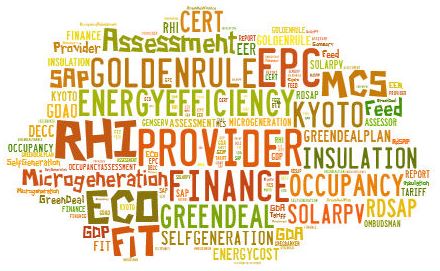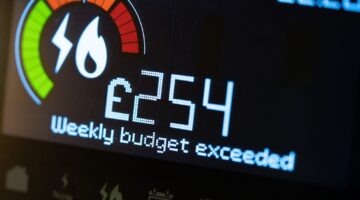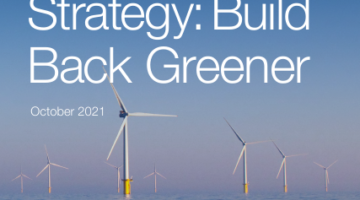
THE GREEN DEAL JARGON BUSTER
The Green Deal is the Government’s flagship initiative aimed at improving the energy efficiency of the housing stock within the UK. This jargon buster should be useful to help you navigate around some of the more confusing terminology.
CERT (carbon emission renewable target) – This was introduced in 2008 to help the UK meet its legally binding carbon dioxide reduction target, as defined by the Kyoto Protocol. It was replaced in early 2013 by the Energy Company Obligation.
DECC (Department of Energy and Climate Change) – This is the Government ministry in the UK responsible for implementing policy and advising ministers on energy and climate change. The Secretary of State is currently Ed Davey MP and the Minister responsible for Green Deal delivery is Greg Barker MP.
ECO (Energy Company Obligation) – The Energy Company Obligation will see the energy companies spend about £1.3 billion a year for the next 10 years on subsidising home energy improvements. ECO will focus on providing energy efficiency measures to low income consumers and those living in ‘hard to treat’ properties, such as period homes. It will be used where the golden rule cannot be met as part of the Green Deal.
EER (Energy Efficiency Rating) – this shows the overall energy efficiency of a property and is measured by a rating from A-G. This is underpinned by a scale (1-100) and calculated by the RdSAP software, 1 is bad, 100 is perfectly energy efficient, with the national average around 60.
EPC (Energy performance certificate) – This is the 1st part of the Green Deal Assessment (and is also required when a homeowner rents or sells their property). This involves an assessor inspecting the dwelling, taking photos and noting various measurements like the heat loss perimeter, thickness of loft insulation and so forth. The finished EPC will give the home a rating out of 100 based on its energy efficiency and will highlight various solutions that would help improve the energy efficiency of the home.
Feed-in Tariff (FiT) – If you generate your own electricity, your energy provider will pay you for each kWh you produce, regardless of whether this is used in the house or sold back to the electric grid (however you will get a further payment if you sell it back to the grid). The rate paid varies based on the size of the system, the technology installed and when you put the system in. Currently wind, solar, micro-hydroelectric, micro-CHP and anaerobic digestion are the technologies covered by the FiT. To benefit, your installation needs to be MCS certified and completed by an MCS qualified installer.
Gemserv – this is the independent oversight body (set-up by the energy companies) to manage the day-to-day activities of the Green Deal on behalf of DECC. They are also responsible for setting up and managing the approval process for advisors, installers and products.
Golden Rule – this is the underlying principle the Green Deal has been built upon, which is: the cost of installing the energy efficiency measures should not exceed the anticipated savings they are expected to deliver. Simplifying this further, the savings you make from installing a measure are used to pay for it, your bill should not increase when you install the measures (except due to fuel price increases).
Green Deal – This is the Government’s flagship initiative to increase the energy efficiency of all homes in the UK. Energy efficiency improvements will be installed in homes with no upfront costs to the homeowner or tenant – the energy efficiency improvements are paid through the savings on the energy bill.
Green Deal Advisory Organisation (GDAO) – These organisations are responsible for managing the delivery of the green deal assessment and ensuring that the advisors give impartial and appropriate advice.
Green Deal Assessor – Sometimes referred to as a Green Deal Advisor, this is the person that completes the initial green deal assessment on the home, they need to be qualified, registered with a GDAO to advise and submit the Green Deal report.
The Green Deal Finance Company (TGDFC) – This is a not for profit company set up in March 2012 that provides a source of finance for all Green Deal Providers, and providing consistent quotes for specific loan amounts and durations across the whole of the scheme. Members include British Gas, Carillion, E.ON, EDF Energy, Insta Group, Kingfisher, Mark Group, nPower and SSE.
Green Deal Plan – This contains the contract the customer is undertaking by having the Green Deal. It includes the duration, the cost, the repayments and the anticipated energy savings from the installed measures.
Green Deal Provider – A provider organisation primarily manages the approval of the Green Deal Plan, arranging the financing and the installation of any Green Deal measures. They may also employ Green Deal Advisors so as to cover the whole end-to-end process.
Green Deal Report – this is a report issued by the Green Deal Advisor after completing the Green Deal Assessment. The assessment has two parts: one, the Energy Performance Certificate (EPC) and two, the occupancy assessment.
MCS (Microgeneration certification scheme) – a certification scheme that is administered by UKAS and represents a standard of quality that the industry should strive to achieve. On completion of this, installers of solar PV, wind and other self generation technologies will have proof of competency in their field. A customer that has an MCS certificate can claim for Feed-in Tariff payments.
Occupancy Assessment – This is the 2nd part of the Green Deal Assessment, and involves a short interview with the homeowner to better understand their energy usage patterns, further honing the accuracy of the EPC. This is key to the production of an accurate Green Deal Report.
RDSAP (Reduced Standard Assessment Procedure) – This is a customised piece of software that allows Green Deal assessors and Domestic Energy assessors to perform EPCs on existing properties. This is a simplified version of the full SAP and ensures compliance with building regulation Part L1B
Renewable Heat Incentive – Like the FiT, the renewable heat incentive is a payment made by the utility company for each unit of hot water you produce. The Renewable Heat Incentive is due to launch summer 2013.
SAP (Standard Assessment Procedure) – This is the Government’s approved methodology for calculating the energy efficiency of dwellings in the UK. It works by assessing how much energy is consumed by a property and how much carbon dioxide is emitted to keep it at a defined level of comfort, thus allowing for comparisons between different houses.
Self Generation – Sometimes known as microgeneration, this refers to producing your own electricity or hot water using technologies like solar PV, wind turbines or solar collectors.












No Comments yet! Be the first one.